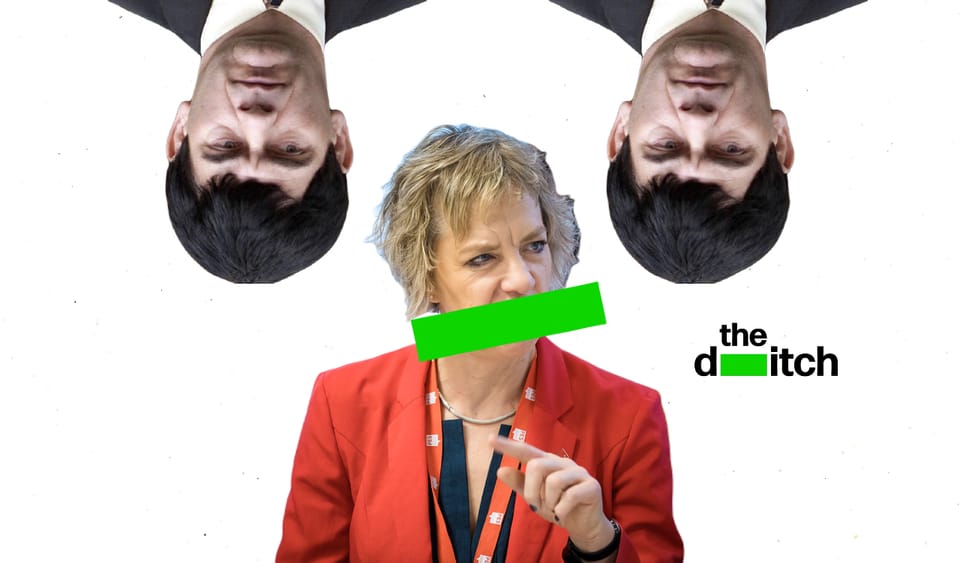It is difficult to get a man to understand something, wrote Upton Sinclair, when his salary depends on his not understanding it. No surprise that the Labour Party leader doesn’t get why so many people in Dublin’s north inner city voted for a certain general election candidate.
Speaking to Virgin Media from a count centre last week, Ivana Bacik expressed disgust at Gerard The Monk Hutch’s popularity with voters, who gave him 3,098 first preferences. "We are appalled, as I think many people are, to see the high preference vote that Gerry Hutch has got," she said, when it still seemed Hutch could win. "And I do think, we will, when the dust has settled, have to look and see why, what was the reason so many people felt compelled to vote for him."
Hutch ultimately lost the fourth seat in the Dublin Central constituency to the Labour Party's Marie Sherlock. It came down to transfers from Paschal Donohoe's surplus. Sherlock received 1,032 transfers to reach 6,102, while Hutch got just 127 to reach 5,321 – a final margin of 781 votes. Not a bad result for someone whose election campaign had supposedly “ended in debacle” a few weeks previously.
To understand how Hutch commanded such support, Bacik would need to consider why many in his corner of Dublin feel as though they're in direct conflict with the state. But that would mean examining policies that have caused deprivation in the area – policies enacted by the Labour Party, whose senior members still maintain they were justified.
Between 2011 and 2016, Labour implemented cuts that devastated working class communities. They slashed nearly €500 million from health, cut €700 million from social welfare and removed funding for disadvantaged children in schools. They took away winter fuel payments and child benefit, while making it harder to qualify for disability support. Student fees increased despite Labour’s promises they wouldn’t and vital community services were dismantled.
Social murder, Friedrich Engels called it: when one class places another in a position where they inevitably meet an early and unnatural death. This is what Labour did last time it held the levers of power. It was known between 2011 and 2016 that austerity kills – but Labour went ahead with it anyway, making the most vulnerable pay for the crimes of economic elites.
Here's what Bacik really finds objectionable about Hutch's popularity: the notion that some voters wagered that someone like him could represent their interests better than her party.
A Gregoryite, basically
Hutch's true motivation for running remains unclear. "He's basically a Gregoryite," another election candidate told me recently. "Hutch as a politician would have been an opportunist and populist who'd fight for resources for his patch."
The legacy of Tony Gregory continues to influence Dublin Central politics. It was his support base that Hutch was able to mobilise to vote for him. As an Independent TD from 1982 until his death in 2009, Gregory practised a transactional politics, most famously through the Gregory deal, which secured investment for his constituency in exchange for supporting Charlie Haughey’s government.
This agreement, valued at roughly £100 million, included commitments on housing, employment, education and development of the docklands area. Another component was the establishment of an Inner-City Authority, with Gregory as chairperson, and plans for developing 27 acres in Custom House Docks. (The deal's full implementation was cut short when the Haughey government fell in November 1982, though some initiatives in housing, employment and education were enacted before the collapse).
What would have stopped Gerry Hutch from doing the same thing, assuming for a moment he really wanted to? Both Fianna Fáil and Fine Gael have demonstrated their pragmatism about partnering with convicted criminals, relying on the support of North Tipperary TD Michael Lowry. The Moriarty Tribunal found that Lowry, as communications minister, secured a contract for Denis O'Brien and that O'Brien made payments to Lowry after it was awarded. In 2018 Lowry was convicted of tax offences at Dublin Circuit Criminal Court.
These findings haven't stopped either party from seeking and accepting his support.
I’m beginning to believe I done it meself
In Capital, Marx wrote that behind the illusion of free and equal exchange in capitalist society lies "primitive accumulation" – the violent historical process through which wealth and property are concentrated in the hands of the few. This violence does not disappear once capitalist property relations are established; rather, it becomes institutionalised through what Lenin would later call "the special bodies of armed men" – police, courts, and prisons – that maintain these relations on behalf of the state.
It would be easy to attribute Hutch's success to media coverage he received. But that overlooks the reason so many people supported him. Much of his appeal derived from the perception that he has outmanoeuvred institutions of state power – institutions that by their very design hurt people in his constituency. Hutch has repeatedly made a mockery of a system that claims fairness, equality and the rule of law but fails to apply those principles equally. And he has done so very publicly.
During the 1990s police questioned Hutch in relation to two of the most lucrative armed robberies in the history of the state. He was never charged with either. When RTÉ crime correspondent Paul Reynolds later told him to confess because everyone believes he was involved, Hutch replied, "Why do they believe that?… Because they read it in the paper… I'm beginning to believe I done it myself."
A few years after paying a £1.2-million settlement to the Criminal Assets Bureau, approximately half of which he paid in cash, Hutch opened a limousine service named Carry Any Body.
Hutch’s election campaign, conducted while on bail for money laundering charges, was marked by moments of comedy. When journalists at Dublin Airport asked Hutch whose seat he might take shortly after announcing his candidacy, he answered, "I'm not pushed – any seat will do me." Campaign footage showed him cruising through Dublin blaring The Boys Are Back in Town from his van while encouraging people to vote. An image circulated online of one of his campaign posters outside what was once the Regency Hotel – the site where David Byrne was murdered, a crime for which Hutch stood trial and was acquitted by the Special Criminal Court.
His Dáil run clearly resonated beyond where Hutch grew up – people in every area in Dublin Central voted for him, while his recent Crime World podcast interview hit more than 500,000 views in two weeks.
Another right wing colation for Labour (if they get their way)
People like Bacik, people outraged that someone like Hutch almost walked the corridors of power, are never willing to acknowledge the violence that sustains the current distribution of wealth and power – the physical force and coercion wielded by the state to maintain an unjust status quo.
When one sees the neglect and deprivation in parts of Dublin, it is easy to comprehend why some people might conclude that any violence that Gerry Hutch was alleged to have been involved in is dwarfed by the actions committed by the state and its custodians. And it is easy to see why they might decide to vote for a parish pump politician who says he will work on their behalf.
As the Labour Party prepares to support another right wing coalition with no regard for working class lives, the north inner city should expect more harm than Gerry Hutch could ever cause.
Labour will never again be a genuine party of the left, with the potential to achieve real change, until it confronts its role in destroying communities across Ireland. This refusal to reckon with its own legacy was perhaps best captured in Alan Kelly's 2016 interview on the Irish Times' Inside Politics podcast. Following Labour's electoral collapse, rather than acknowledge the damage done by austerity, Kelly suggested the Irish people were basically ungrateful.
But any honest appraisal by Labour of the suffering they have caused, of the social murder they have committed, will result in one inevitable conclusion – they'll begin to believe they done it themselves.


